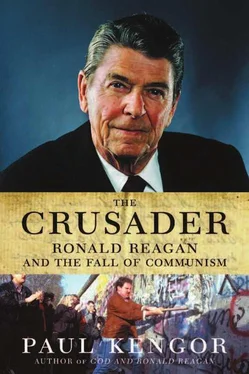Saving a drowning victim is not an easy task under any circumstance, but it was especially difficult in the treacherous Rock River with its swirling currents and murky, dark water. Downstream from the river was a dam. When the sluices were opened, the normally slow current quickly picked up its tempo. Reagan remembered the “deeper thrust” this created in the water. The area surprised swimmers by sloping off just a few feet from the edge. Dutch learned that the shortest route from shore to shore was never a straight line but a swooping upstream arc. 18This swift-moving body of water is so thick, with currents so strong and dangerous, that swimming there today is banned and has been for years.
FORGING A TEFLON CONFIDENCE
The object here is not to transform Ronald Wilson Reagan into a political superhero, nor to focus on the positive to the complete exclusion of any negatives. The point is that these very real rescues, these feats of physical daring (of which this is a short list), impacted him greatly, forming an indelible mark on his psyche. 19And they shaped him not just as a person but, one day, as a president of remarkable ambition.
Generally, these experiences taught Reagan quite a bit about life. A later close friend and National Security Advisor, Bill Clark, often listened to Reagan reminisce about those summer days and eventually came to believe that the lifeguarding instilled in the young man a basic respect for the dignity and sanctity of human life. This quality later manifested itself in President Reagan’s opposition to abortion, abhorrence of the prospect of nuclear war, and empathy for the suffering citizens of the so-called Captive Nations behind the Iron Curtain. 20
More fundamentally, the rescues did wonders for Reagan’s self-esteem. Not many youngsters have saved a life, certainly not seventy-seven souls in such a risky fashion. 21What better reinforcement to a man’s self-worth than such incidents? How many people have directly saved another human being? How many individuals have done so well over seventy times, salvaging lives out of the grim pull of dark water? All of this happened in real life for Ronald Reagan, not in movies. Here were the seeds of his can-do attitude.
Of course, there were other influences. Downstream from the Rock River sat the First Christian Church on 123 South Hennepin Avenue, only nine blocks from Ronald Reagan’s boyhood home. The faith that he acquired there, under the nurturing of Rev. Ben Cleaver and his mother Nelle—it was Nelle who was the most formative figure in his life—became a fundamental source of Reagan’s confidence. 22He was sure that God had a plan for his life and guided him daily along a preordained path that was just and right, and which made him confidently optimistic. Nelle taught him that “all things were part of God’s Plan, even the most disheartening setbacks, and in the end, everything worked out for the best.” 23He never abandoned that belief.
It seems fitting that the church which influenced Reagan was perched alongside the Rock River, as the river would help shape him through its religious and personal significance. Indeed, he had two baptisms which took place on the banks of the river, one spiritual and one sacrificial. The water of the Rock River forever changed Reagan, and he followed its currents not only down stream to the First Christian Church but eventually to the oceans of the world.
These cold waters of Illinois forged a confidence in Reagan that ran far deeper than the Rock River. It was this confidence that transcended his actions, weaving its way into every aspect of his life. Its pervasive nature exists throughout his biography—from the Gipper all the way to the Oval Office. This confidence became the bedrock of Reagan’s personality, an unappreciated intangible that helped him achieve his goals. His was not a mere confidence but an unshakable one.
Indeed, pundits in the 1980s called Reagan the “Teflon President” because, like a Teflon frying pan, nothing unseemly appeared to stick to him. He just shook or washed it off. He was seemingly invincible. “I’m amazed at this Teflon Presidency,” CBS Evening News anchor Walter Cronkite awed. “Reagan is even more popular than [Franklin] Roosevelt, and I never thought I’d see anyone that well-liked…. Nobody hates Reagan. It’s amazing.” 24Even the president’s fiercest critics usually liked him as a person. And even the Soviets remarked upon his “‘Teflon’ qualities,” as they put it, and “protective ‘Teflon’ coating.” 25That Teflon quality can be ascribed to Reagan’s confidence.
It took someone of this immense confidence to predict and believe that he could win the Cold War. This required not only uncommon fortitude in his own vision but also in the boldness to pursue the provocative policies that he felt were necessary to achieve that vision. As will be seen throughout the pages ahead, the steps Reagan authorized were extremely daring; and yet, he was unwavering in his belief that he could lead America to victory in the Cold War. In the face of boisterous criticism, he never shied away from his inner voice. It was the voice that led him to James Raider’s rescue in the murky depths of the Rock River. It was the voice that led him to seek another save—to pursue Cold War victory when few put stock in the possibility, and amid naysayers all around him. 26
2. Reagan’s Long March: The 1940s
IN 1946, RONALD REAGAN WAS ON LOCATION FILMING A MOVIE in a remote area in rural California. Now a seasoned actor and active member of the Screen Actors Guild (SAG), Reagan was almost ten years into his film career. He was told by a crew member that he had a telephone call waiting at a nearby gas station. Reagan hopped in a car and made his way to the station. At the time, he was preparing a report for SAG concluding (correctly) that the 1946 strike was jurisdictional rather than over wages and hours—a position unpopular with Communists who wanted to portray the strike as the fault of greedy studio heads. 1Spearheading the strike was the Red-dominated Conference of Studio Unions (CSU), led by a Communist thug named Herb Sorrell, who Reagan charitably described as “a large and muscular man with a most aggressive attitude.” 2
Reagan arrived at the gas station and answered the phone. “I was told,” he said later, “that if I made the report a squad was ready to take care of me and fix my face so that I would never be in pictures again.” Specifically, the caller threatened to splash acid upon Reagan’s unsuspecting million-dollar face—the source of his livelihood. 3
Such fears were nothing new for Reagan: in another instance during this period, the bus he was scheduled to ride through studio picket lines was bombed and burned just before he boarded. As a result of such episodes, police began guarding Reagan’s home and children, and he began packing a Smith & Wesson revolver, which he took to bed each night. 4For the first of innumerable times throughout his very public life, from Hollywood to Sacramento to Washington, Reagan started receiving death threats. 5Reagan would always remain a nice guy, but now he was chastened—a warrior, a Cold Warrior. From then on, he was in the ring.
When Ronald Reagan arrived in Hollywood in 1937, Communism was not the first thing on his mind. After his success at the lifeguard stand, he embarked on an equally successful career in radio, becoming a broadcaster of Chicago Cubs games from the 50,000-watt WHO, the NBC affiliate in Des Moines, Iowa. Here he was no longer calling out to absent-minded swimmers; instead, his voice could be heard in kitchen after kitchen, barn after barn, and car after car throughout middle America during the Great Depression. As the Depression came to a close, Dutch began looking for a new challenge, seeking to change mediums and parlay his radio experience into something much grander—a career in the movies. While many people labored for years to make this transition, Reagan’s intrinsic confidence apparently told him that such a career shift would be neither impossible nor long in the making.
Читать дальше












